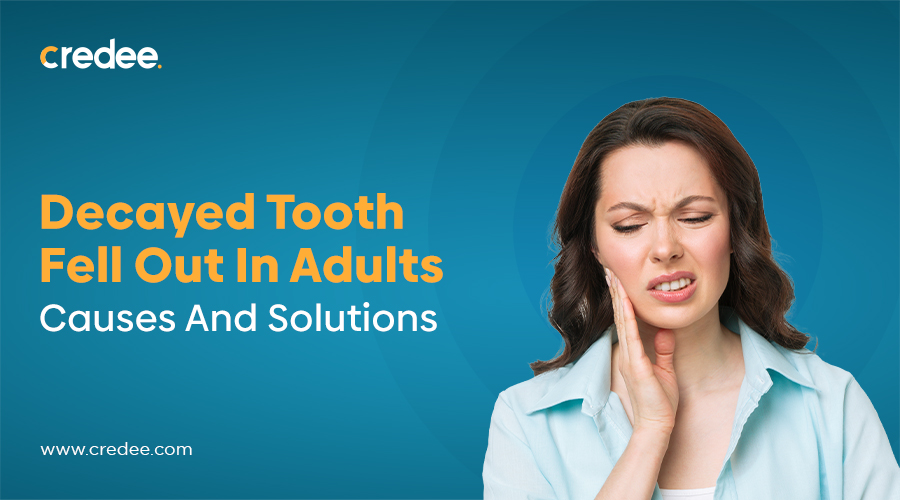
Losing a decayed tooth as an adult can be really upsetting and stressful. Our teeth can face more problems, and decay can hit harder as we age. For many, it's not just about losing a tooth—it's about the impact on how we feel about ourselves, how we look, and even how we eat and speak. That sudden gap can feel like a harsh reminder of aging, making the experience even more unsettling. It’s a strong nudge to keep up with dental care, no matter our age, to keep our smiles and confidence intact.
| According to the CDC, about 1 in 8 adults aged 65 and older have lost all their teeth. |
Why Did The Tooth Fall Out?
According to the CDC, untreated cavities and gum disease (which leads to bone loss) are the top two causes of tooth loss. With falling teeth comes jawbone loss and lower self-confidence.
| Adults with certain health conditions are at least 50% more likely to experience complete or severe tooth loss compared to those without these conditions. These conditions include: - Diabetes - Emphysema - Fair or poor general health - Heart disease - Asthma - Liver conditions - Rheumatoid arthritis Source: CDC |
What To Do When A Rotten Tooth Falls Out?
When a rotten tooth falls out in adults, here’s what needs to be done:
Tooth Preservation: Handle the tooth carefully by avoiding touching its root, instead hold it from the top. Soak the tooth in a tooth preservation solution till the time of reaching the dentist.
Connect With Your Dentist: Seek dental care immediately so that the fallen tooth can be saved.
Rinse Your Mouth: Rinsing the mouth with water can help you get rid of the blood or debris.
Pain Management: If there’s pain in the area, use an over-the-counter medicine to control it and apply a cold compress or an ice pack to reduce inflammation.
Symptoms Of A Rotten Tooth
A rotten tooth, or a decayed or infected one, can really affect your day-to-day comfort. Here are some signs to watch out for:
- Toothache: You might feel sharp, throbbing, or constant pain.
- Sensitivity: Eating or drinking something hot, cold, sweet, or acidic might cause discomfort.
- Visible Holes Or Dark Spots: Look for cavities or dark areas on your teeth.
- Bad Breath: Persistent bad odor or taste could be a sign of bacterial growth.
- Swelling Or Pus: Swollen gums or pus around the tooth might mean an abscess.
- Discoloration: Teeth can look brown, black, or show white spots early on.
- Loose Tooth: As decay worsens, your tooth may feel loose.
- Pain When Biting: Chewing might become uncomfortable.
If you notice any of these symptoms, seeing a dentist promptly is important to prevent further complications.
Find out how to make dental crowns affordable without insurance.
What Causes Rotten Teeth In Adults?
Taking care of your teeth is more important than you might think. Here are some common reasons why teeth can start to rot in adults:
Poor Oral Hygiene: Skipping regular brushing and flossing lets bacteria and plaque stick around, leading to decay and cavities over time.
Buildup Of Plaque And Bacteria: Plaque is a sticky film of bacteria that coats your teeth. If it's not cleaned off, it releases acids that damage enamel, causing tooth decay.
High-Sugar Diet: Sugary foods and drinks fuel harmful bacteria, which produce acids that attack and break down tooth enamel.
Frequent Acidic Foods And Drinks: Regularly consuming things like soda, citrus, and coffee can erode enamel, making your teeth more vulnerable to decay.
Smoking Or Tobacco Use: Tobacco reduces saliva production and raises the risk of gum disease, leading to decay and tooth loss.
Dry Mouth: Certain medications or conditions can cause dry mouth, which means less saliva to wash away acids and bacteria, increasing the chance of decay.
Lack Of Fluoride: Fluoride helps strengthen enamel and fight decay, so not getting enough from water or toothpaste can make teeth weaker.
Skipping Dental Checkups: Missing regular cleanings and checkups allows plaque and tartar to build up, raising your risk of cavities and gum disease.
Gum Disease: If left untreated, gum disease can cause gums to recede and teeth to decay, eventually leading to rotting teeth.
Treatment Options For Adult Tooth Falling Out
Treatment options for rotten teeth in adults vary based on how severe the decay is and the overall condition of the teeth. Here are some of the common treatments:
- Fluoride Treatments And Sealants: For early-stage decay, fluoride treatments can strengthen enamel and help prevent further damage. Dental sealants, which are thin coatings applied to the chewing surfaces of back teeth, can also help protect against decay.
- Root Canal: A root canal may be required if decay reaches the tooth’s pulp. This involves removing the infected tissue inside the tooth, cleaning it out, and sealing it to prevent further infection.
- Tooth Extraction: Extraction might be the only solution when a tooth is too damaged to be saved. After removal, the gap can be filled with options like implants, bridges, or dentures.
- Fillings: When decay is caught early, a dentist can clean out the affected area and fill the cavity with materials like composite resin, amalgam, or porcelain, restoring the tooth’s structure.
- Crowns: Crowns may be necessary for teeth with significant damage. These custom-made caps cover the entire tooth, protecting it and restoring its appearance and function.
- Dental Bridges: Bridges can replace one or more missing teeth by anchoring an artificial tooth to the healthy teeth on either side.
- Dentures: For those who are missing many teeth or have severe decay, partial or full dentures can be a good option. These removable appliances help restore both the look and function of natural teeth.
- Dental Implants: Implants are a permanent option for missing or extracted teeth. A metal post is surgically placed in the jawbone to act as a new root, and a crown is attached on top to function like a natural tooth.

Discover Affordable Denture Solutions for Seniors Today!
Explore MoreHow To Prevent Adult Tooth Loss?
Preventing tooth decay is all about taking care of your teeth consistently. Here are some simple yet effective ways to keep your teeth healthy and strong:
Keep Up With Daily Oral Hygiene: Brush your teeth twice daily with fluoride toothpaste and floss regularly to remove food and plaque between your teeth and gums.
Visit Your Dentist Regularly: Schedule dental checkups and cleanings every six months. Regular visits help catch any early signs of decay and keep your teeth in good shape.
Watch Your Diet: Avoid sugary snacks, sodas, and acidic foods that can wear down your enamel. If you indulge, rinse your mouth with water afterward to help minimize the impact.
Use Fluoride: Fluoride is your enamel’s best friend—it helps strengthen your teeth and protect them from decay. Use fluoride toothpaste, and ask your dentist about extra fluoride treatments if needed.
Eat A Balanced Diet: Eating a variety of nutritious foods, like fruits, veggies, whole grains, and dairy, supports your overall oral health. Foods rich in calcium, like milk and cheese, are great for your teeth.
Stay Hydrated: Drinking water, especially fluoridated water, helps wash away food particles and bacteria, reducing your risk of cavities.
Avoid Tobacco: Smoking and tobacco use can increase the risk of decay and gum disease. Steering clear of these habits helps keep your teeth and gums healthier.
Get Dental Sealants: Dental sealants are a protective coating applied to the back teeth to help prevent cavities, especially in kids or adults prone to decay.
How Much Does The Treatment Of Falling Teeth Cost?
Here's a general overview of the cost of various dental treatments that may be involved when dealing with teeth that are falling out. The actual costs can vary significantly based on factors like location, the complexity of the procedure, the materials used, and whether you have dental insurance. Here's a basic breakdown in a tabular format:
| Treatment | Estimated Cost (Per Tooth) |
|---|---|
| Root Canal | $700 - $1,500 |
| Tooth Extraction | $75 - $300 (simple) $200 - $600 (surgical) |
| Fillings | $100 - $400 |
| Crowns | $800 - $2,000 |
| Dental Bridges | $1,500 - $5,000 |
| Dentures | $1,000 - $3,000 (partial) $1,500 - $5,000 (full) |
| Dental Implants | $3,000 - $6,000 (per implant) |
Part Of Decayed Tooth Fell Out? Why It Happened And What To Do?
If a part of your decayed tooth fell out, it means there is an extreme cavity and you need immediate dental attention. A small cavity in the tooth will not make it fall because the decay hasn’t done enough damage to weaken it. But when the cavity gets large, it can damage enough of the enamel and dentin, causing the tooth to break down and possibly fall out. When a cavity is left untreated, it keeps growing and eventually hollows out the tooth. If you bite into something hard, the weakened outer part of the tooth can break and collapse.
So, if part of your tooth fell out, it's likely because the cavity became so large that it hollowed out the inside, causing the tooth to collapse under its own weight. Here’s what can be done if a part of the decayed tooth has fallen out:
| Stage | Level | Solution |
|---|---|---|
| Enamel Damage | Minor | Dental Filling |
| Dentin Damage | Intermediate | Filling or Dental Crown |
| Pulp Damage | Advanced | Root Canal Treatment |
| Furcation Damage | Extreme | Tooth Removal |
Cut The Chase With Credee Payment Plans
When it comes to treating falling teeth in adults, Credee is a true savior. With Credee, you don’t have to worry about the high costs of essential dental procedures like root canals, crowns, or implants. With flexible installment plans, you can manage the cost of treatment without the stress of paying everything upfront, significantly reducing the financial burden on adult customers.
How Flexible Payment Plans Work For You?
Flexible payment plans offer several advantages to customers, making it easier for them to access the products and services they need without financial strain:
Affordability: Customers can spread the cost over time, making it easier to fit larger purchases or necessary expenses into their budgets.
Access To Services: Flexible payment options allow customers to access essential services, like dental care, without having to wait until they save up enough money.
Reduced Financial Stress: Instead of paying a lump sum upfront, customers can make smaller, manageable payments, which eases the financial burden and reduces stress.
No Credit Checks: Credee’s flexible payment plans, do not require credit checks, allowing customers with varying credit histories to still qualify for financing.
Opportunity To Upgrade: With manageable payments, customers are more likely to opt for better or higher-quality products and services that they might not afford otherwise.
To Wrap Up
Losing a decayed tooth as an adult is more than just a dental issue—it’s an emotional and practical challenge that can affect how you feel about yourself, how you eat, and how you interact with others. Remember, you’re not alone in this journey, and taking action quickly can make a world of difference. Whether it’s preserving a fallen tooth, seeking immediate dental care, or exploring treatments like fillings, crowns, or implants, the key is not to delay. Your smile, your comfort, and your health matter.
And if the cost is a concern, options like Credee’s flexible payment plans can help ease the financial burden, allowing you to get the care you need without the stress. Stay proactive, keep up with your dental care, and know that every step you take today is an investment in your future well-being and confidence.
FAQ
1. My Tooth Fell Out But No Blood.
If your tooth fell out and there’s no blood, chances are the tooth was dead already, meaning, there was no blood supply and the pulp had already been compromised.
2. Rotten Tooth Fell Out But Root Still In.
If you have a broken tooth, it’s important to see a dentist right away to avoid infection and other issues. Depending on your specific situation, the dentist may need to perform a root canal or extraction to address the problem.
If you leave it untreated, the broken tooth may cause pain, this can make things worse over time. It can lead to increased discomfort and make everyday activities like brushing or eating difficult. That’s why it’s essential to have any remaining pieces of the tooth and its roots professionally removed to prevent further complications.
3. Will A Dead Tooth Fall Out?
Eventually, it will but why wait for it to happen? It’s always recommended to get the dead tooth extracted or else it can cause serious oral health issues.
4. My Tooth Fell Out And Now I Have A Hole. What Should I Do?
If your tooth has fallen out and left a hole, here’s what you should do:
- Rinse Your Mouth: Use warm salt water to gently clean the area.
- Avoid Touching: Don’t touch the area with your tongue or fingers to prevent infection.
- Manage Discomfort: Use over-the-counter pain relievers and a cold compress to ease pain and swelling.
- Preserve The Tooth (if intact): Keep the tooth moist in milk or inside your mouth until you see a dentist.
- See A Dentist ASAP: Schedule an appointment quickly for a professional evaluation and treatment.
- Follow The Dentist’s Advice: They may suggest options like implants, bridges, or dentures to replace the missing tooth.
5. My Tooth Filling Fell Out. What Do I Do Now?
If your filling falls out, first check to make sure it didn’t break apart with your crown, and avoid chewing on it. A lost filling can damage your tooth and might cause pain. Then, make an appointment with your dentist as soon as possible to get the filling replaced and prevent further issues.
Don't let tooth decay ruin your smile! Explore flexible payment options for dental treatments!
Schedule A Demo Now



